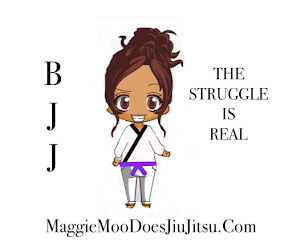Grappling with Grief: Jiu Jitsu After Loss
A few months ago a friend of mine lost her partner and asked me "How did you manage to go back to Jiu Jitsu after losing your father? I can't even get out of bed." This was too familiar. We discuss Jiu Jitsu as therapy and for so many of us it is, however, when facing catasprohic grief, getting to training feels like the greatest battle you will ever face.
I lost my father (rather unexpectedly) last April and it is a pain like none other I've ever felt. It was like waking up in someone else's life. One of the benefits of Jiu Jitsu is that it helps us deal with emotions, work through difficulty and cope with depression. When you lose someone you love, the loss manifests itself in so many ways. Grief is not neat. It is not linear. It is not reasonable. It doesn't listen to your requests, or your feelings. Grief leaves unwashed dishes in the sink, makes bathing feel like an arduous task, it forgets, creates new physical pains you never knew existed, eats way too much or way too little and grief sleeps. Grief sleeps a lot, until it doesn't, and then it keeps you awake for hours on end.You obsess about how that person smelled, how they walked, the sound of their voice and all of the little things you know you should have said. Grief makes you a relic collecter, who grasps all of the tiny pieces of that person before they fly away. The biggest fear is the forgetting. It becomes an obsession.It comes in great waves of horrible sadness and then profound guilt when you have an enjoyable moment. Grief makes it difficult to reach out, to focus or even enjoy the things you used to love. For me, that was Jiu Jitsu.
I spent the first weeks in bed, sleeping, crying, refusing to move unless it was to use the restroom or drag myself to work. I had pains I'd never felt before, I gained weight and I had no interest in doing anything. People reached out and messages went unanswered. One day, my boyfriend dragged me to the gym. The first day I returned to Jiu Jitsu, I tried my hardest to keep my head down and hoped no one would say "I'm sorry for your loss" or ask how I was doing. The truth is, I'd rehearsed what I would say for hours each day "Thank you. I'm sorry too." My team mates were persistent in reaching out to me. They were unrelenting even if they weren't asking me "will you be training tonight?" They were encouraging, even though my game was completey off. My brain was foggy, my hands didn't work, I walked around in a daze for weeks at training. Each day I would tell myself the goal is just to get out of bed even if everything hurt. Then the goal became to drive to class. Each day it was a little more "I will remember a technique" or "I will roll a few rounds." When grief became a bottomless pit of disbelief and dissillusionment, Jiu Jitsu was still there and more importantly, so were my team mates. The first people to check in on me were my Jiu Jitsu partners past and present. They didn't treat me like I was fragile or broken, they didn't take it easy on me and they pushed me harder than I ever remember working. They reminded me that I didn't have to be great, I just needed to keep going.
My father had loved the fact that I was training. He'd taken an interest in my journey and competitions. I decided that if I set a goal for him, I might have a little closure. I set my sights on Pan Ams. When my father was alive, I told him I was going to win Pan Ams and Master Worlds. It had been a silly offhand comment at the time, but suddently it became a real and attainable goal. I was desperate to work towards something, I was desperate to make him proud. That goal got me out of bed, losing some of the grief weight I'd gained, and most importantly no longer thinking of my father tragically, but rather as my greatest motivation. Training was still hard, but surviving each round reminded me that I was strong and I was capable. In comparison to losing my father, being a little tired was really nothing. I wrote down the things I needed to do:
Getting Back to Training:
1. Set small attainable goals- "I will do one class a week" etc.
2. Be patient with yourself as your body/mind adjust to a new reality.
3. Realize nothing about grief is linear and some days will be better than others.
4. Find team mates to hold you accountable and some you can confide in.
5. Think about training as a series of steps. "If I can achieve this, next I will move on to this"
6. Set a long term goal to work towards, something that requires your daily attention.
7. Let yourself grieve: be angry, cry and let yourself heal.
The healing hasn't been as fast as I wanted it to be, but when my hand was raised during the final match of Pan Ams, I felt absolutely triumphant. Sure, getting gold was great, but feeling like I did something to honor my father was the best I'd felt since I'd lost him. It was a symbolic triumph over grief that had taken so much from me. The memory of my father motivated me to do my best and it still does.
 |
| Pan Ams |














0 comments: